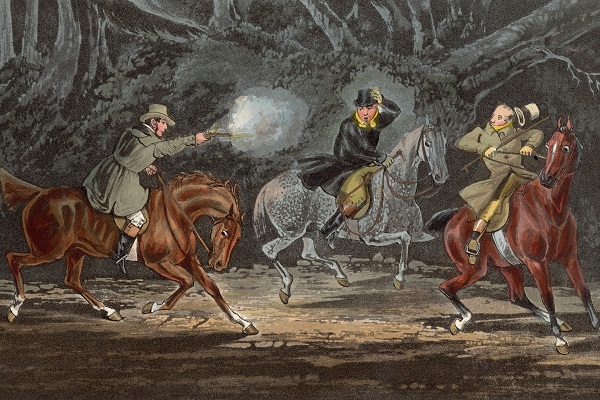The English language is, as English would have it, an odd duck. Its nuances are capricious — to the non-native, maliciously so — but its lyricism widely praised. My preoccupation with language possibly stems from my first profession, that of a stage actress (throughout the course of this esteemed career, I made literally hundreds of dollars). Trained to mimic accents from public school Brit to Dixieland Southern belle, I was continually delighted by regionalisms. When I ceased auditioning and commenced scribbling, my fascination with ripe local slang never left me.
When I decided to pen the tale of day one, cop one of the New York City Police Department, I hit the triple cherry jackpot of language freaks: the NYPD’s first Chief, George Washington Matsell, wrote a dictionary called Vocabulum, or The Rogue’s Lexicon in which he recorded ‘the secret language of crime.’ I was instantly fascinated. Matsell wrote the lexicon as a guide for his less slang-savvy officers, so that they could comprehend the argot used by New York City’s professional rogues and rascals. The tongue was called “flash,” and it stands with the proudest of plagues in its infiltration of speech as we Manhattanites know it today. Within a few heady seconds, I’d determined to learn the language, to wallow about in Matsell’s dictionary, and to populate the world of 1845 New York and its first police force with flash speakers. The result was my novel The Gods of Gotham, in which both the peacekeepers and the underworld denizens they attempt to govern speak a flamboyant amalgam of English and rude slang.
Because it was based on British thieves’ cant, flash bears a curious kinship with dead sister languages across the globe — dialects once spoken in Ireland and Australia by the poorer classes who likewise absorbed the criminal parlance of their feistier neighbors. And in every outgrowth of the British Empire, “cant” eventually developed into the casual slang of the modern city dweller. Whether thieves’ cant was invented by the 16th century Derbyshire rascals who occupied a cave called The Devil’s Arse and plagued highway travelers with their murderous thievery can never be known for certain, but it is more than likely (and I challenge any language to produce a more floridly romantic creator than the King of the Gypsies himself). But whichever clever scallywags first minted the tongue, they did so in order to speak freely of mayhem without fear of being overheard by the law-abiding — and thus thwarted in their dark designs. When cant speakers traveled to places like Ireland, America, and Australia, their speech expanded and adapted accordingly. But they never lost their taste for coded conversation, and their terminology spread through working class neighborhoods.
Both cant and flash and all their localized variations are feasts of overripe metaphor and rich onomatopoeia. A cursory examination of A Dictionary of Slang, Jargon, and Cant reveals flounder: men who rifle the pockets of drowned people; and keep your pecker up: do not lose heart. “Pecker” is the mouth. From “pecker,” a bird’s bill. I won’t comment on the latter’s American meaning — but as to the former, the Thames was frequently dragged for unclaimed booty, even loot still attached to its deceased original owners in the form of gold teeth. Many flash expressions are delightfully whimsical, and all variations reflect the personality of their particular region. In Australia, a drunken fellow would have been too fond of tipping the little finger, and in America shot in the neck, while in Ireland, a lush was said to be up in his hat.
One finds put to bed with a shovel: buried in the earth, and the combined court and police headquarters was referred to almost universally as the Tombs. Strange international doubles often appear. While rome ville is always slang for London in thieves’ cant, it means New York in flash, and a Yankee handkerchief thief was unselfconsciously termed a St. Giles buzzman despite the fact he may never have set eyes on St. Giles. What began as a Derbyshire experiment in getting away with murder blossomed into dialects that recalled their origins even when spoken hundreds or thousands of miles away.
Slang both confounded Chief Matsell and fascinated him. He states in the prologue to his dictionary that ‘these cant words and phrases are becoming interwoven with our language and many of them are becoming recognized Anglicisms.’ British friends have commented to me that the flash term gingerly is still often used in the UK, pal is slang for comrade in almost any English-speaking country, and who can question the global popularity of O.K.? (Coined facetiously in New England by men jokingly misspelling “oll correct” for “all correct.”) Even the upper classes, look down their patrician noses though they may, failed to resist the allure of slang — their favored sons, guilty of ‘slumming it’ on the town, brought flash back into their grand parlors to the horror of prim grandmothers on at least three continents.
So whatever English-speaking country you may call home, you have flash to thank for peppering your tongue with spicy phrases like kick the bucket. The language of criminals? No longer! Raise a glass to the villains and adventuresses among your ancestors — the enterprising ne’er-do-wells who may have donned brass knuckles or lifted a purse from time to time, but who forever changed the way we speak. In my humble opinion, for the better.
The Gods of Gotham by Lyndsay Faye is published in paperback by Headline.






Comments